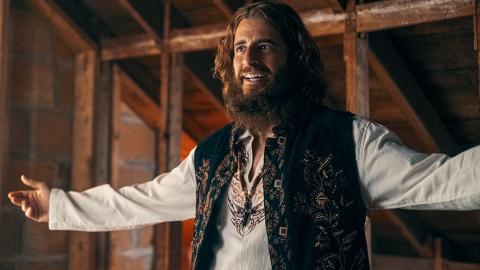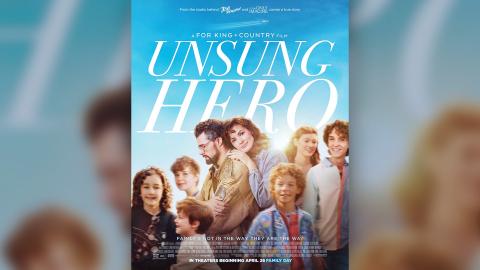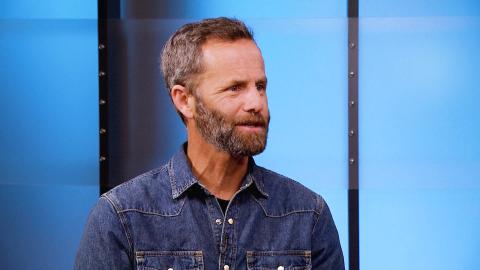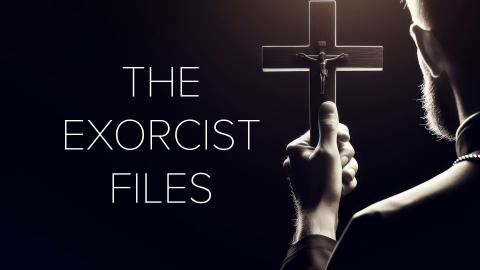
'No Coincidence': Jonathan Roumie Says Revival Could Signal Cultural Embrace of God on 'Massive Scale'
Jonathan Roumie — known for portraying Jesus on the hit series “The Chosen” — is swapping his first-century tunic for flower power patterns in the new movie, “Jesus Revolution.”
The film, chronicling the Jesus Movement that swept Southern California in the early 1970s, debuted in theaters across the country Friday. In the movie, Roumie plays hippie evangelist Lonnie Frisbee, whose unorthodox and oft-explosive relationship with Calvary Chapel founder Chuck Smith sparked a massive revival.
“There’s so much packed into one film,” Roumie told CBN’s Faithwire. “It’s pretty extraordinary that they were able to condense it and tell it in such a way that I think it’s gonna be a really powerful film.”
Listen to the latest episode of CBN’s Quick Start podcast
Frisbee’s story — one of childhood abuse, drug use, and a struggle with sexual immorality — mimics the experiences of many in today’s culture: The hippie preacher, who died of AIDS on March 12, 1993, turned to many vices to numb the deep pain he felt, even after coming to Christ.
That, though, didn’t stop the Lord from using him to leave indelible marks on countless people’s lives.
In his research for the film, Roumie, who is Catholic, learned about Frisbee’s eccentric salvation story: A spiritual encounter that came amid an LSD trip in a California desert, where the now-famed hippie saw “a vision” of himself sharing the Gospel with thousands from his own renegade generation.
“He came out of this vision pretty sobered and started immediately just preaching the Gospel,” said Roumie. “He had always had a connection to his faith from the time he was a kid, I think from some of his maternal authority figures in his life. But when he had this vision, he kind of got the call, got the commission from God to go do this phenomenal thing and God equipped him with some phenomenally powerful and intense gifts of the Holy Spirit.”
The story of Greg Laurie, founding pastor of Harvest Christian Fellowship in Riverside, California, is central to “Jesus Revolution.” In fact, it was Frisbee who played a pivotal role early on in Laurie’s faith journey, even baptizing the well-known evangelist in Pirate’s Cove some 50 years ago.
LISTEN TO OUR CONVERSATION WITH ROUMIE:
In a blog post about the film — and Frisbee’s impact on his life — Laurie wrote, “Lonnie led a multitude to Christ and was one of those characters whose whole was more than the sum of his parts. From a distance, he seemed unimpressive. But up close, he had a powerful charisma that was larger than life.”
But past traumas led Frisbee down a winding path, often distracting him from the conviction and calling the Lord placed on his life. Those distractions, often punctuated by sexual promiscuity, recurring drug habits, and a penchant for theatrics rather than authentic discipleship, led Smith to distance himself from Frisbee — a split Laurie described as “unfortunate,” albeit necessary.
“Chuck stayed put and nurtured his flock while Lonnie went to a fellowship in Florida,” wrote Laurie. “It was unfortunate because, as long as Lonnie was around Chuck Smith and his systematic teaching of Scripture, he seemed to thrive. But without Chuck’s influence, Lonnie was drawn in by people with skewed theology.”
Frisbee spent much of his remaining life chasing after the “glory days” of the Jesus Movement, as Laurie put it, but was met with an untimely diagnosis that stopped him in his tracks. Toward the end of his life, Frisbee — a complex but undoubtedly anointed man — expressed regret for his choices, repented, and returned to God before succumbing to the effects of the virus.
The stories of each of the characters featured in “Jesus Revolution” — Frisbee, Smith, Laurie — feel strangely familiar in a culture half a century later that seems just as divided, discouraged, and aimless.
Roumie, for his part, believes the timing of the release of this film is nothing short of divine, particularly as so many around the country have been fixated on the spiritual awakening at Asbury University in Wilmore, Kentucky, and other university campuses across the country.
The prayer and worship event, which followed a routine chapel service in early February, has been led without fanfare or glamour by college students — members of Generation Z — mimicking an awakening that occurred on the same campus in February 1970.
As the Asbury revival moves off a campus that has been teeming with thousands of visitors from around the U.S., similar awakenings seem to be breaking out elsewhere around the country.
“There is no coincidence,” said Roumie. “The popularity of ‘The Chosen,’ its success in theaters in the release last month, the release of this film on the heels of this week-plus-long prayer service, thousands of people showing up at Asbury University, I don’t think anything is coincidental or done by chance or happenstance.”
“I think God has a purpose in everything that He does,” he continued, “and I think this is a moment where the culture is being reactivated to welcome Him back into the culture on a massive scale, potentially a global scale.”
***As the number of voices facing big-tech censorship continues to grow, please sign up for Faithwire’s daily newsletter and download the CBN News app, to stay up-to-date with the latest news from a distinctly Christian perspective.***




